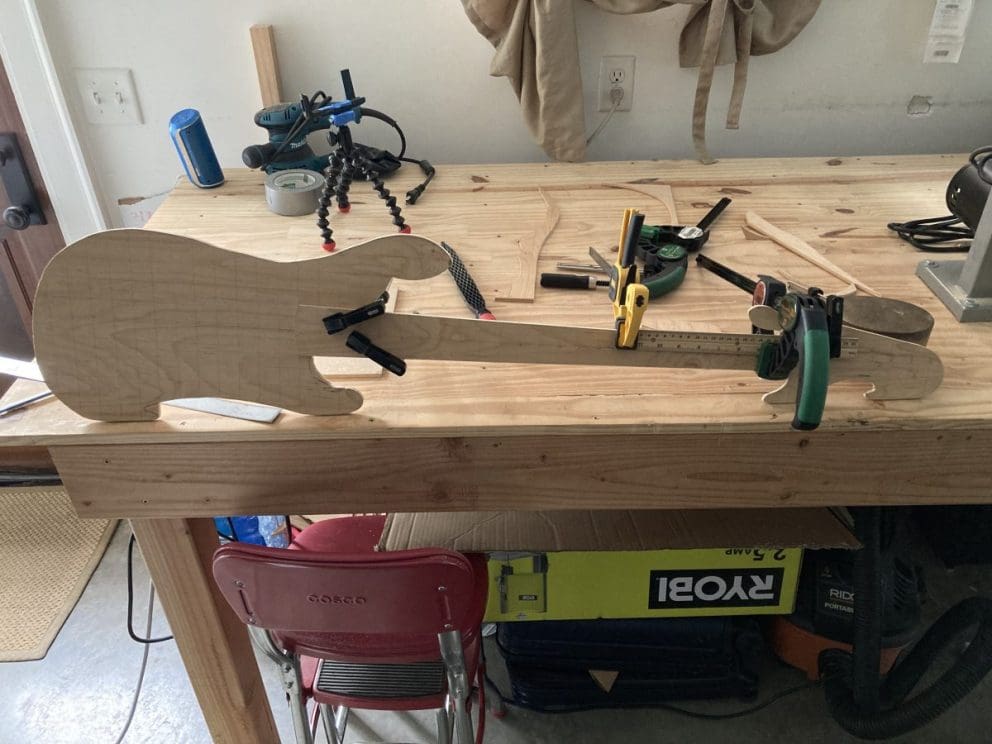
Each year, Duke University grants Benenson Awards in the Arts, which provide funding for fees, travel, and other educational expenses for arts-centered projects proposed by undergraduates (including graduating seniors). The deadline for 2024 Benenson Award applications is Monday, March 18! The Benenson Awards contribute to students’ artistic passions. We recently spoke with 2023 awardee Mauro Mastrapasqua ’25, a math & physics major about building his dream bass guitar from scratch.
I had built engineering projects throughout middle and high school for Science Olympiad, and so woodworking was becoming a larger interest of mine, and it became a main hobby of mine during COVID. There are a few aspects about different basses I have seen that I really like (effects on board, no frets, and minimal electronics), and I wanted them to all be combined in the same instrument. I wanted an instrument that I could play for a long time and truly call my own.
With no basis for how to begin, I knew I just needed to start getting my hands dirty at the beginning of the summer, and so I figured I would get the parts I could find and build the design around those. The main two measurement things that I needed to make sure would mathematically work were the scale length (the length from the bridge to the nut) and the shape of the headstock, such that the strings would be able to all line up at the right angles. Aside from that, I was able to work a lot around the parts I had been able to find, especially when hollowing out the control cavity to fit the electronics.

My home is in Nashville where Gibson has their headquarters, and I had a connection to their interim CEO, whom I was fortunate enough to meet with over the summer. I got to see Gibson’s office and many of their guitars, which were inspiring for the future basses I may build.
I had already done most of the design by this point. Whom I learned the most about were the folks who ran various wood shops around Nashville, namely Sons of Sawdust and Good Wood Nashville. They taught me about all the various kinds of wood and showed me where best to cut on it. Additionally, I made a friend at Modman Guitars in Nashville, who sold me a vintage Fender pickup (which still had cloth-insulated wires) which he had in his spare parts box. The people at those three places were so kind to work with a beginner, and they took the time to ensure I was buying what I wanted.
 Your project was self-guided. How did you maintain self-discipline and stay motivated throughout the summer?
Your project was self-guided. How did you maintain self-discipline and stay motivated throughout the summer?I learned very quickly that most tasks took at least twice as long as I thought they would, so by June, I was already nervous about how much left I had to go. There were many small items I needed to complete with many different tools, so it was easy to feel like there was more work to do than there really was. I did not feel like I was making progress until I mapped out my path to the finish line on my chalkboard, after which I had a better idea of what I needed to do (and more importantly when I was going to do it). I also use my small notebook religiously, which was important for planning, sketching, and keeping track of any ideas I had regarding the project. It wasn’t easy to maintain motivation when things were not working as planned though, and admittedly much of the work came down to some long days and nights in my garage in the final weeks of summer.
You do not need to have a conventional project or program to apply for a Benenson Award! The details of my project had only vaguely been fleshed out by the time I submitted my application, and I had no experience building musical instruments.
What I showed on the application was that I was deeply passionate about playing the bass and woodworking, and I had been thinking about the project for a long time.
If the project is something you are truly passionate about, then you want to make sure anyone reading your application knows how badly you want this opportunity!
